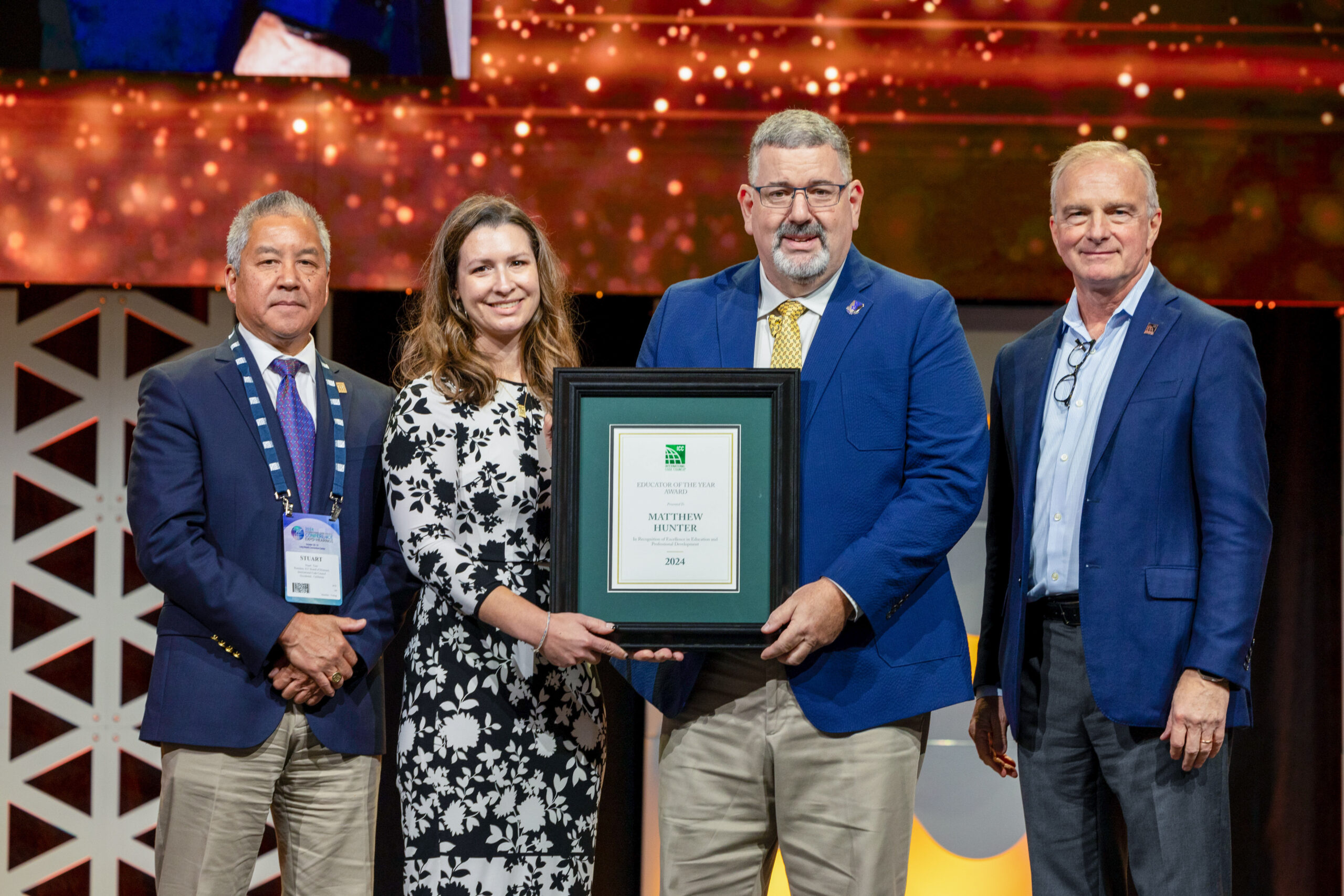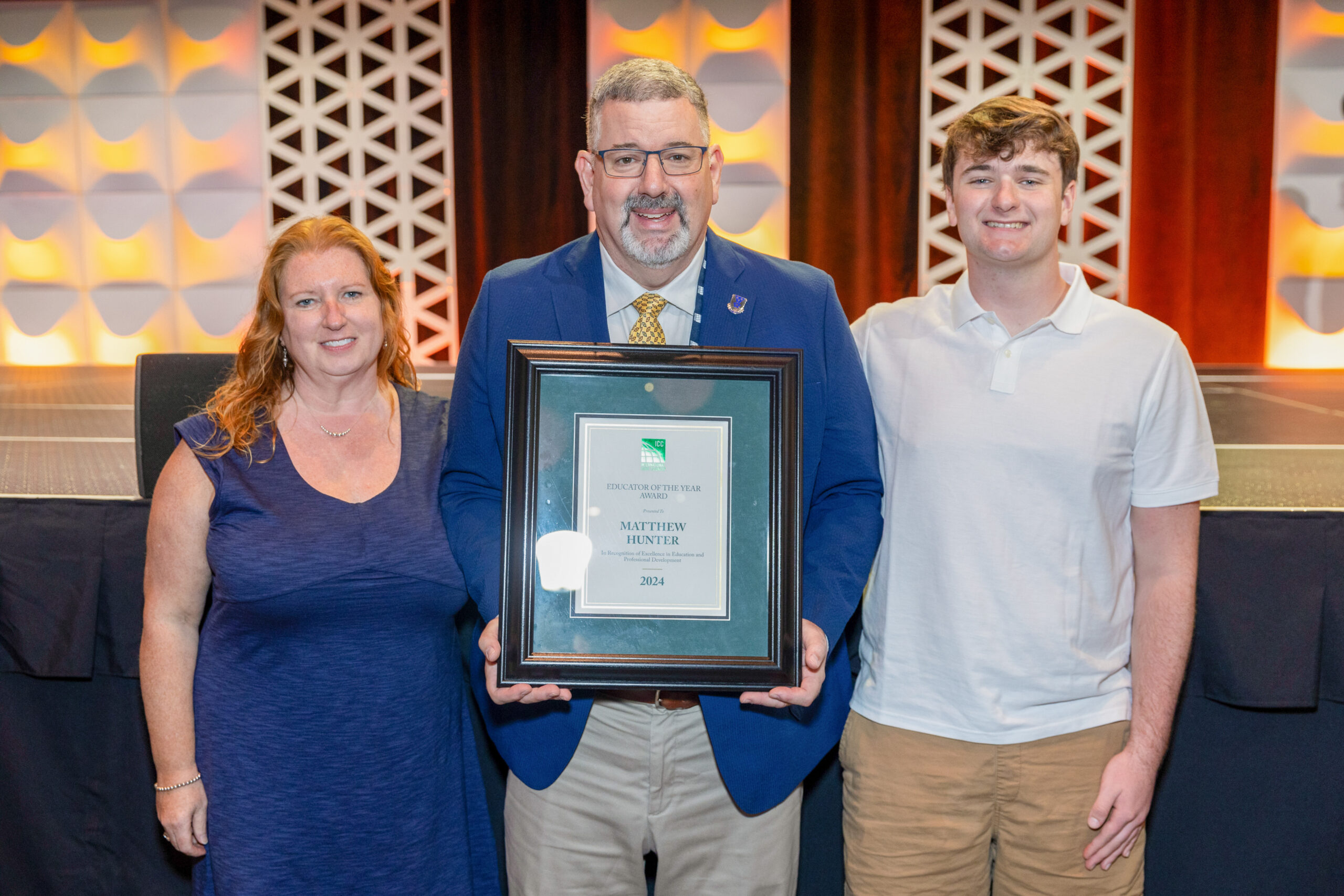
Matthew Hunter, Northeast Regional Manager at the American Wood Council, Receives 2024 Educator of the Year Award
The Code Council is proud to honor Matthew Hunter, CBO, BCO, Northeast Regional Manager at the American Wood Council, with the 2024 Educator of the Year Award.
Matthew Hunter, the recipient of the International Code Council’s 2024 Educator of the Year Award, has helped thousands of students learn how to become better building safety professionals by taking the time to learn what they experience, what they need and how they can improve. He doesn’t merely instruct; he engages and will happily take the time to answer any and all questions relating to the class topic.
“My absolute goal is that everyone who attends my classes, at a bare minimum, gets something out of it,” said Hunter, CBO, BCO, Northeast Regional Manager at the American Wood Council. “If they’re new to the topic at hand, I want them to at least remember the key tenets that I’m referring to. There are clear teaching objectives that are assigned or created when a course is first made. But to tell a story or provide some personal insight into the specific code, the specific area you’re teaching on, you can get down to that individual code official’s or building inspector’s level.”

Hunter’s commitment to education attracted two nominations for the Educator of the Year Award, which was created in honor of Brent Snyder, a renowned Code Council educator and Past Presiding Officer. The award recognizes those who excel in promoting professional development.
“Matt has been an amazing asset to the code enforcement community in Maine for the past decade,” said Benjamin McDougal, Code Enforcement Officer for the Town of Cape Elizabeth. “It’s not always easy getting quality, consistent training and support due to being one of the less populated and least convenient places to get to in the northeast. [But] Matt is always willing to go out of his way to satisfy our training needs. He goes above and beyond this.”
McDougal said that Hunter always arrives early and stays late and takes the time to speak with everyone in attendance.
“[He] makes everyone feel comfortable asking questions,” McDougal added. “He can seamlessly field a question from a high-level engineering perspective, then [field another question] from the most rudimentary beginner perspective, without anyone noticing. He really has a knack for making everyone feel comfortable in a learning atmosphere. I would send an 18-year-old kid to one of his trainings or a seasoned structural engineer. They both would gain valuable insight from Matt.”
Teaching Building Safety is About Active Engagement
Hunter’s teaching philosophy is simple but incredibly effective: engage with students at every turn. It’s not enough to simply teach the class – he wants students to ask questions so that he can provide the information and insights they need most.
“I want to learn from my audience what specific issues related to code enforcement or compliance they’re seeing,” Hunter explained. “Based on what they say, I shift on-the-fly and try to address any and all issues they might be having. I’d much rather answer a question satisfactorily and provide guidance on that one specific issue than go through the entire deck of slides.”
Hunter stressed the importance of interacting with code officials to explain why a code exists and the benefits of using it. Conversely, he questioned: if no one bothers to do so and code officials don’t understand what they’re trying to enforce, then what’s the point?
“We have to have that engagement, we have to have that buy-in from our audience,” Hunter affirmed. “I think that’s key, earning the trust of the code officials and the inspectors and building relationships. It’s all about relationships.”
Age, experience and other factors also play a role in how Hunter teaches.
“I really try to tailor my programs from an introduction standpoint,” he added. “I try to coach and give some tips and tricks to the younger generation – for example, looking at the Code Council’s commentary publications.”
The International Building Code® (IBC) and the International Residential Code® (IRC) are invaluable tools for building safety professionals, contractors, architects and anyone else who needs to learn about building codes. But without the commentaries that accompany both the IBC and IRC, they’ll miss out on critical information.
“The Code Council commentary is brilliant because it tells the story behind the code language,” said Hunter. “If you want to know why a certain style building or occupancy building is required to be sprinklered, read the commentary. It tells the story of why the code language is the way it is. It’s a synopsis of input from the community from the Code Development Hearings. A lot of people don’t read the commentary, they just get the code book, and they don’t take a deeper dive.”
Hunter also suggested that code officials should pay more attention to the images within the code books, which highlight essential details that cannot be expressed with words alone.
“Hats off to the Code Council, their publications include fantastic drawings and construction details,” said Hunter. “If you’re new and you don’t know anything about construction and building safety, look at the pictures, they’re trying to show you how the structure – that you’re going to inspect – should appear.”
A Fulfilling Career and a Passion for Helping Others Follow in His Footsteps
Hunter, an active-duty army veteran, began his career in construction, but it didn’t take long for building safety to find him. Like so many in the industry, he didn’t plan on or seek out a career as a code official, but his boss at Pennoni Associates needed someone to do the job. He handed Hunter a copy of the IRC, told him to read up and take a test. Hunter passed and then went through the certification process through the State of Pennsylvania.
His transition to building safety proved to be rewarding and provided a bit of unexpected job security. He started working as a building inspector in 2006, just two years before the housing crisis brought homebuilding to a screeching halt.
“In 2008, land development operations almost ceased for engineer and design firms for subdivisions and residential development,” Hunter recalled. “So, I kept busy doing municipal work, both engineer inspections and building code inspections.”
Hunter served as a code official, sewage enforcement officer, building inspector, field inspector, plans examiner, civil engineering designer and draftsperson before joining the American Wood Council in 2015. He is active in ICC Regions VI & VII and serves on both the Code Council’s Sustainability Membership Council (SMC) and the (SEHPCAC).
He is also the Vice-Chair for the ASTM E60.80 General Sustainability Standards Committee and serves on the Industry Advisory Council for the Pennsylvania Housing Research Council, which is affiliated with Penn State College of Engineering.
“I’m incredibly honored and humbled to receive recognition from my peers,” said Hunter. “In my heart I’m still a code official, and I think that brings a lot of credibility to my presentations and my interactions with code officials. I’ve done their job for over a decade. I know the trials and tribulations they’re going through, so to receive this recognition from those folks who are members of the Code Council is really humbling. I was taken aback by the whole thing. I’m not sure I’ve quite processed it all, but it’s wonderful to receive the acknowledgement and recognition of my peers at the Code Council.”

To learn more about the Code Council’s annual awards, click here.








